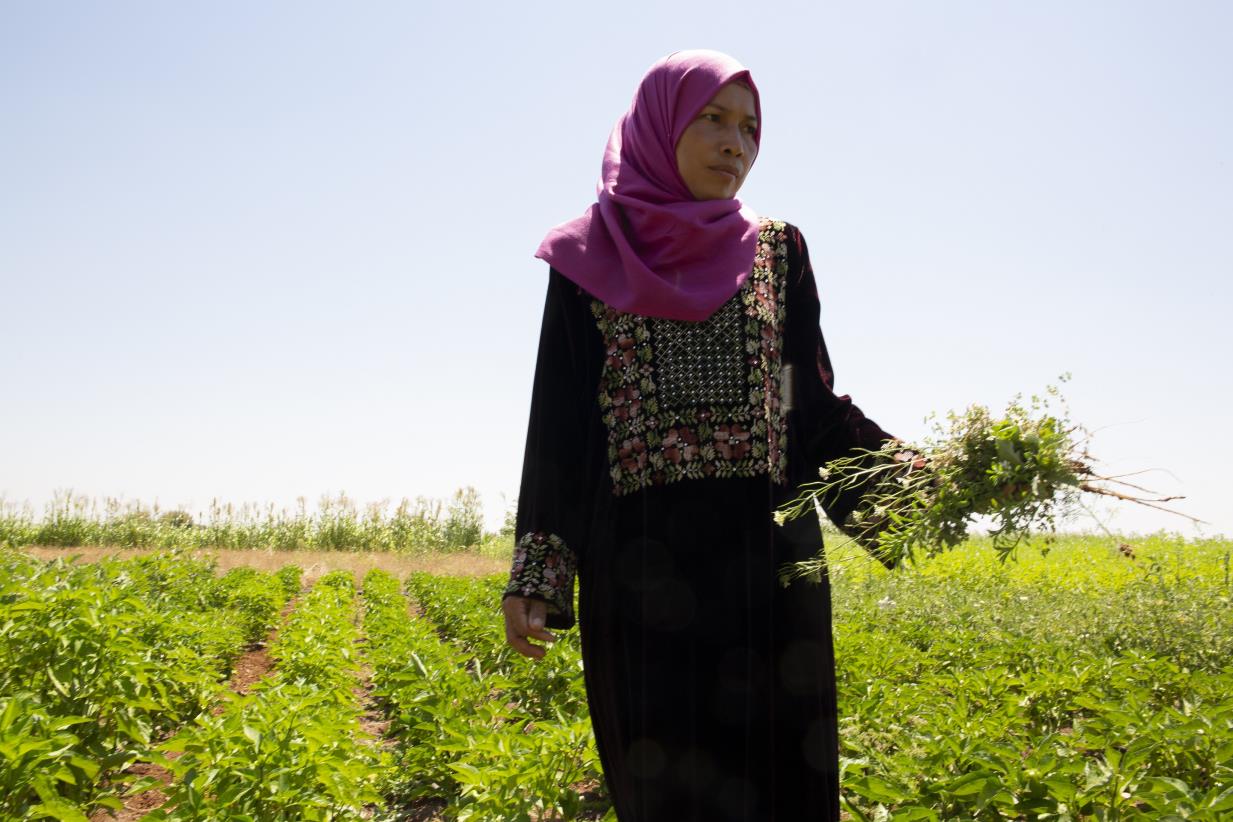Melly and Bilal: Resuming life in Daraa after clashes

Melly Rawashdeh in her fields. ©FAO/Mohammed Namour
September 2020, Daraa, Syria - Among the harshest armed clashes in 2012 were those in Daraa governorate in the south of Syria, which forced thousands of rural families to flee to other governorates or to neighbouring Jordan or Lebanon. The latter route was eventually taken by Melly Rawashdeh, a 40-year-old housewife from the Philippines, married to Bilal Rawashda, living in Ibtaa in Daraa governorate with their three children, two young sons and a 2-year-old daughter.
The couple fled the country, seeking safety and hoping to find prospects to make a good living.
“We always believed in a brighter future in our own country, we constantly dreamt of returning to our land. However, the escalating insecure situation in Syria back then made our dreams fade. We had to find a way to earn a living in Beirut, so my husband took work as an electrician worker,” Melly recalls.
After five years, the security situation in Daraa governorate had improved, thousands of rural families returned to their damaged houses and drylands, including Melly and her family. Yet, the living conditions were tough; the family did not have access to electricity, sufficient drinking water or water for irrigation. When they managed to obtain a limited amount of water for farming, they could not afford seed for planting.
“In Beirut, we bought our vegetable from the market. This is not a familiar practice for producers like us; we are used to consuming fresh vegetables from our land,” agreed Bilal and Melly.
“We expect a brighter future, but we need a helping hand to resume our life here is Daraa. We need support to resume cultivation activities and to survive,” said Melly Rawashdeh.
Thousands of returnee farmers and rural families are in the same situation, needing support to resume farming for their own consumption and as a source of livelihood. FAO, with the support of the Government of Kuwait, has reached 3,000 returnee families in Daraa and As-Suwaida governorates with tomato, eggplant and sweet pepper seedlings. Each family was able to produce up to 1,500 kg of fresh vegetables from a small plot of land.
“Today, I harvest from my land to cook food, this is better than buying vegetable from the market as I guarantee the vegetable’s quality for my children,” said Melly, adding “my favourite sort of vegetables to plant are tomatoes and eggplants; they grow quickly and are easy to manage in terms of agricultural practices. Now I can make tomato paste and Makdous, a famous traditional Syrian dish prepared with small eggplants.”
“It is wonderful to see our lands green and growing vegetable successfully, thanks to FAO for encouraging us and other farmers to return to their lands and invest in planting. We celebrate our produce by sharing the surplus with our family and neighbours who are in need,” stated Melly and Bilal.
FAO and the Government of Kuwait have partnered to assist the most vulnerable rural families enhance their livelihoods and food security; ensuring food access and availability for everyone is key to contribute in achieving Zero Hunger (SDG 2) in the country. Furthermore, the ongoing partnership also has ambitions to fight hunger and malnutrition, and come to the aid of disaster-stricken communities, across the Near East and North Africa (NENA) region and beyond, in countries such as Yemen, Somalia, South Sudan and Nigeria.
